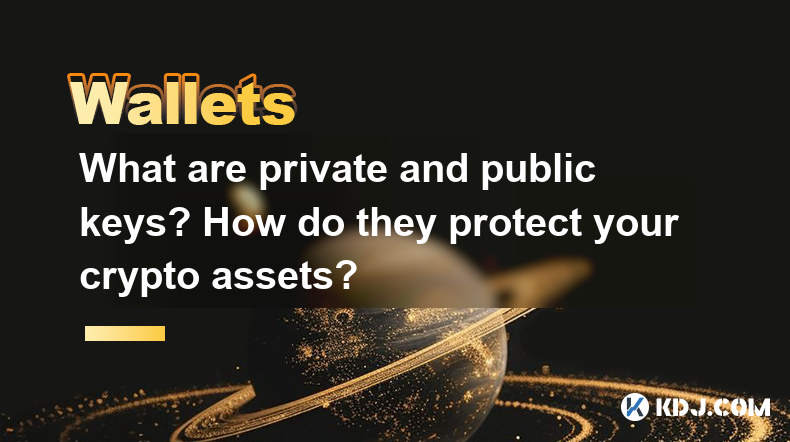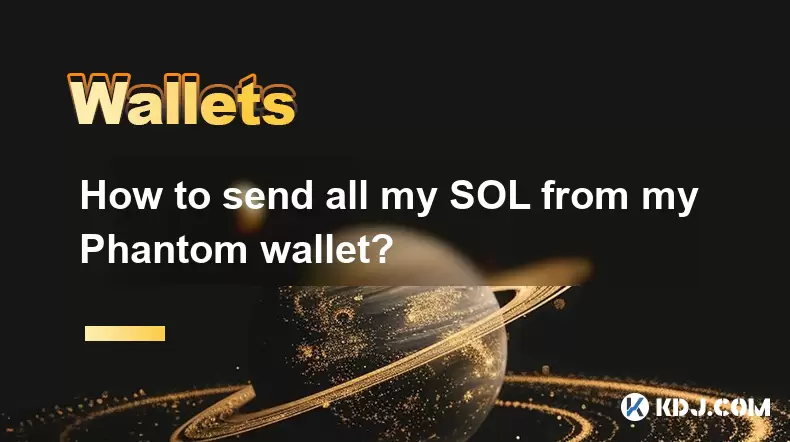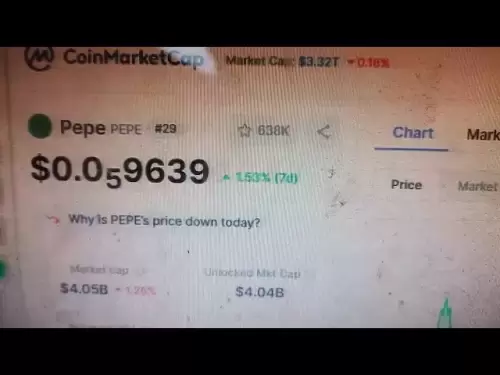-
 Bitcoin
Bitcoin $108,250.0992
0.11% -
 Ethereum
Ethereum $2,515.9404
0.03% -
 Tether USDt
Tether USDt $1.0003
0.00% -
 XRP
XRP $2.2166
-0.19% -
 BNB
BNB $656.5904
0.29% -
 Solana
Solana $147.4122
-0.58% -
 USDC
USDC $1.0000
-0.01% -
 TRON
TRON $0.2830
0.06% -
 Dogecoin
Dogecoin $0.1641
0.27% -
 Cardano
Cardano $0.5739
-0.19% -
 Hyperliquid
Hyperliquid $39.1463
-0.11% -
 Sui
Sui $2.8882
-0.02% -
 Bitcoin Cash
Bitcoin Cash $487.6428
0.31% -
 Chainlink
Chainlink $13.2097
0.07% -
 UNUS SED LEO
UNUS SED LEO $9.0308
0.10% -
 Avalanche
Avalanche $17.8608
0.13% -
 Stellar
Stellar $0.2379
-0.06% -
 Toncoin
Toncoin $2.7400
-0.39% -
 Shiba Inu
Shiba Inu $0.0...01144
-0.36% -
 Litecoin
Litecoin $87.5467
0.66% -
 Hedera
Hedera $0.1538
0.22% -
 Monero
Monero $315.5479
0.36% -
 Dai
Dai $1.0000
0.00% -
 Polkadot
Polkadot $3.3523
-0.71% -
 Ethena USDe
Ethena USDe $1.0003
0.01% -
 Bitget Token
Bitget Token $4.3960
-1.03% -
 Uniswap
Uniswap $7.2663
4.19% -
 Aave
Aave $272.8619
2.04% -
 Pepe
Pepe $0.0...09676
-0.18% -
 Pi
Pi $0.4586
-2.87%
What are private and public keys? How do they protect your crypto assets?
Private and public keys secure crypto assets by authorizing transactions and verifying authenticity, ensuring only the owner can access funds.
Apr 13, 2025 at 06:00 am

What are Private and Public Keys? How Do They Protect Your Crypto Assets?
In the world of cryptocurrencies, securing your digital assets is paramount. The foundation of this security lies in the use of private and public keys. Understanding these keys and their roles is crucial for anyone involved in the crypto space. This article will delve into what private and public keys are, how they function, and how they safeguard your cryptocurrency.
What is a Private Key?
A private key is a crucial component of cryptographic systems used in cryptocurrencies. It is a long, alphanumeric string that serves as a secret code, known only to the owner of the cryptocurrency. This key is used to sign transactions, proving ownership and authorizing the transfer of funds.
The private key is generated through cryptographic algorithms, ensuring its uniqueness and security. It is imperative that the private key remains confidential, as anyone who gains access to it can control the associated cryptocurrency. Losing the private key means losing access to the funds forever, as there is no way to recover it.
What is a Public Key?
In contrast to the private key, a public key is derived from the private key using a one-way mathematical function. This key can be shared openly without compromising the security of the cryptocurrency. The public key is used to receive funds and verify the authenticity of transactions signed by the corresponding private key.
The public key is typically represented in a shorter, more user-friendly format known as a cryptocurrency address. This address is what you share with others to receive payments. The relationship between the private and public keys ensures that while anyone can send funds to your public address, only you, with your private key, can spend those funds.
How Do Private and Public Keys Work Together?
The interplay between private and public keys forms the backbone of cryptocurrency security. When you want to send cryptocurrency, you use your private key to sign the transaction. This signature is verified against your public key, ensuring that the transaction is legitimate and authorized by the owner of the private key.
This system leverages the principles of asymmetric cryptography, where the private key is used for encryption and the public key for decryption. The security of this system lies in the computational difficulty of deriving the private key from the public key, making it virtually impossible for unauthorized parties to access your funds.
How Do Private and Public Keys Protect Your Crypto Assets?
The protection of your crypto assets hinges on the security of your private key. Since the private key is the only means to authorize transactions, keeping it safe is paramount. Here are some ways private and public keys protect your assets:
- Authorization: Only the owner of the private key can sign transactions, ensuring that no one else can move your funds without your consent.
- Verification: The public key allows others to verify the authenticity of transactions, ensuring that the funds are indeed coming from the stated source.
- Anonymity: While the public key can be shared, the private key remains hidden, maintaining the anonymity of the owner.
- Immutable Records: Once a transaction is signed with a private key and verified with a public key, it is recorded on the blockchain, making it immutable and tamper-proof.
Best Practices for Managing Private and Public Keys
Managing your private and public keys effectively is crucial for maintaining the security of your cryptocurrency. Here are some best practices:
- Secure Storage: Store your private key in a secure location, such as a hardware wallet or a safe. Never store it digitally in an unencrypted form.
- Backup: Create multiple backups of your private key and store them in different secure locations. Ensure that these backups are also encrypted.
- Regular Updates: Keep your software and hardware up to date to protect against vulnerabilities that could compromise your keys.
- Avoid Sharing: Never share your private key with anyone. If someone claims to need it for any reason, it is likely a scam.
Common Mistakes to Avoid
Despite the robust security provided by private and public keys, certain mistakes can jeopardize your assets. Here are some common errors to avoid:
- Sharing Private Keys: As mentioned, sharing your private key can lead to immediate loss of funds.
- Storing Private Keys Online: Storing your private key on an internet-connected device increases the risk of hacking and theft.
- Using Weak Passwords: If you encrypt your private key, use a strong, unique password to prevent unauthorized access.
- Neglecting Backups: Failing to create and secure backups of your private key can result in permanent loss of access to your funds if the original is lost or damaged.
Frequently Asked Questions
Q: Can I regenerate a lost private key from my public key?
A: No, it is computationally infeasible to regenerate a private key from a public key due to the one-way nature of the cryptographic functions used.
Q: How can I tell if my private key has been compromised?
A: If you notice unauthorized transactions or if someone else is accessing your funds, your private key may have been compromised. Immediately move your remaining funds to a new address generated with a new private key.
Q: Is it safe to use the same private key for multiple cryptocurrencies?
A: It is generally not recommended to use the same private key for multiple cryptocurrencies, as a compromise in one could affect all. Use separate keys for different assets to enhance security.
Q: Can I change my public key?
A: You cannot change your public key directly, but you can generate a new private key and derive a new public key from it. This is advisable if you suspect your current keys may be compromised.
Disclaimer:info@kdj.com
The information provided is not trading advice. kdj.com does not assume any responsibility for any investments made based on the information provided in this article. Cryptocurrencies are highly volatile and it is highly recommended that you invest with caution after thorough research!
If you believe that the content used on this website infringes your copyright, please contact us immediately (info@kdj.com) and we will delete it promptly.
- Litecoin Breakout Watch: What Traders Need to Know Now
- 2025-07-06 16:50:13
- Bitcoin, Solana, Ethereum: Decoding the Latest Buzz on the Blockchain
- 2025-07-06 16:50:13
- Widnes Resident's 50p Could Be Your Ticket to Easy Street: Rare Coin Mania!
- 2025-07-06 16:55:13
- Bitcoin, Solaris Presale, and Token Rewards: What's the Buzz?
- 2025-07-06 16:55:13
- Ethereum Under Pressure: Price Drop Amid Global Uncertainties
- 2025-07-06 17:00:13
- XRP, SEC Case, and Prosperity: A New Era for XRP Holders?
- 2025-07-06 17:10:13
Related knowledge

How to cancel a pending transaction in Phantom wallet?
Jul 03,2025 at 07:21pm
Understanding Pending Transactions in Phantom WalletA pending transaction in the Phantom wallet occurs when a user initiates a transfer or interaction with the Solana blockchain, but it hasn't yet been confirmed by the network. This can happen due to various reasons such as low transaction fees, network congestion, or incorrect gas settings. It's import...

How to see the estimated value of my tokens in Phantom wallet?
Jul 04,2025 at 12:21am
What is Phantom Wallet?Phantom wallet is one of the most popular cryptocurrency wallets designed for the Solana blockchain. It allows users to store, send, receive, and manage various tokens built on Solana, including SPL tokens and NFTs. The wallet offers a user-friendly interface, making it accessible for both beginners and advanced users in the crypt...

How to lock my Phantom wallet extension?
Jul 03,2025 at 11:14am
What Is the Phantom Wallet and Why Lock It?The Phantom wallet is a popular non-custodial cryptocurrency wallet designed for interacting with the Solana blockchain. Supporting both browser extensions and mobile apps, Phantom allows users to store, send, receive, and stake SOL tokens, as well as interact with decentralized applications (dApps). Securing y...

Does Phantom wallet offer two-factor authentication (2FA)?
Jul 03,2025 at 09:00am
Understanding Phantom Wallet and Its Security FeaturesPhantom wallet is a widely used non-custodial cryptocurrency wallet that supports the Solana blockchain. It allows users to store, send, receive, and interact with decentralized applications (dApps) seamlessly. As security is a top priority for any crypto wallet user, security features like two-facto...

How to send all my SOL from my Phantom wallet?
Jul 06,2025 at 10:00am
Preparing to Send SOL from Your Phantom WalletBefore initiating any transaction, it is crucial to ensure that your Phantom wallet is fully set up and connected to the correct network. Phantom supports multiple networks, but for sending SOL, you must be on the Solana blockchain. Confirm this by checking the network indicator in the top-right corner of th...

What is "rent" on Solana and how does it affect my Phantom wallet?
Jul 02,2025 at 08:35pm
Understanding 'Rent' on SolanaIn the context of Solana, the term 'rent' refers to a storage fee that users pay for maintaining data on the blockchain. Unlike Ethereum, where storage costs are paid once via gas fees during contract deployment, Solana implements a recurring cost model to ensure efficient usage of network resources. This means that any acc...

How to cancel a pending transaction in Phantom wallet?
Jul 03,2025 at 07:21pm
Understanding Pending Transactions in Phantom WalletA pending transaction in the Phantom wallet occurs when a user initiates a transfer or interaction with the Solana blockchain, but it hasn't yet been confirmed by the network. This can happen due to various reasons such as low transaction fees, network congestion, or incorrect gas settings. It's import...

How to see the estimated value of my tokens in Phantom wallet?
Jul 04,2025 at 12:21am
What is Phantom Wallet?Phantom wallet is one of the most popular cryptocurrency wallets designed for the Solana blockchain. It allows users to store, send, receive, and manage various tokens built on Solana, including SPL tokens and NFTs. The wallet offers a user-friendly interface, making it accessible for both beginners and advanced users in the crypt...

How to lock my Phantom wallet extension?
Jul 03,2025 at 11:14am
What Is the Phantom Wallet and Why Lock It?The Phantom wallet is a popular non-custodial cryptocurrency wallet designed for interacting with the Solana blockchain. Supporting both browser extensions and mobile apps, Phantom allows users to store, send, receive, and stake SOL tokens, as well as interact with decentralized applications (dApps). Securing y...

Does Phantom wallet offer two-factor authentication (2FA)?
Jul 03,2025 at 09:00am
Understanding Phantom Wallet and Its Security FeaturesPhantom wallet is a widely used non-custodial cryptocurrency wallet that supports the Solana blockchain. It allows users to store, send, receive, and interact with decentralized applications (dApps) seamlessly. As security is a top priority for any crypto wallet user, security features like two-facto...

How to send all my SOL from my Phantom wallet?
Jul 06,2025 at 10:00am
Preparing to Send SOL from Your Phantom WalletBefore initiating any transaction, it is crucial to ensure that your Phantom wallet is fully set up and connected to the correct network. Phantom supports multiple networks, but for sending SOL, you must be on the Solana blockchain. Confirm this by checking the network indicator in the top-right corner of th...

What is "rent" on Solana and how does it affect my Phantom wallet?
Jul 02,2025 at 08:35pm
Understanding 'Rent' on SolanaIn the context of Solana, the term 'rent' refers to a storage fee that users pay for maintaining data on the blockchain. Unlike Ethereum, where storage costs are paid once via gas fees during contract deployment, Solana implements a recurring cost model to ensure efficient usage of network resources. This means that any acc...
See all articles

























































































